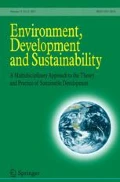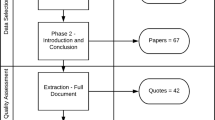Abstract
The new IT governance practices have emerged to adopt a responsible attitude within the company to question its mode of operation, its mode of consumption and its relationship with every IT service. The objective of our research is to ensure that the functions of the company should follow the criteria of coherence and of consonance, in order to develop a corporate culture oriented toward the restoration of the environment, green IT. Knowing how to make information and communication technologies as a catalyst for sustainable development and deploying a specific green framework to the company by using the powers of the artificial intelligence are the aim of our proposed approach. According to the four ecological aspects, the proposed approach, firstly it diagnoses the maturity of the company by grouping the existing processes and the IT needs processes. Secondly it unifies all the processes by using a prototype process. Finally, it evaluates the company’s processes by using a suite of performance indicators then it lists a set of the best ecological recommendations.






Similar content being viewed by others
References
Acemoglu, D., & Restrepo, P. (2018). Artificial intelligence, automation, and work. NBER working paper no. 24196. National Bereau of Economic Research, 2018.
Asadi, S., Hussin, A. R. C., & Dahlan, H. M. (2018). Toward Green IT adoption: From managerial perspective. International Journal of Business Information Systems, 29(1), 106–125.
Bakkas, A., & El Manouar, A. (2018). An efficient business intelligence (BI) model based on green IT and balanced scorecard (BSC). International Journal of Advanced Computer Research, 8(37), 203–211.
Bohas, A. (2013). Vers une analyse de la relation systèmes d’information, développement durable et responsabilité sociale d’entreprise: l’adoption et l’évaluation du Green IT. Thèse de doctorat.
Bohas, A., Berthoud, F., Feltin, G., et al. (March 2019). Norme numérique et green IT. Normaliser le numérique, 5, 22.
Bohas, A., Bouzidi, L., & Chappoz, Y. (2014). Gouvernance des systèmes d’information et éco-responsabilité. Résultats d’une expérimentation auprès d’un conseil régional.
Bohas, A., Dagorn, N., & Poussing, N. (2014b). Responsabilité Sociale de l’Entreprise: quels impacts sur l’adoption de pratiques de Green IT? Systemes d’information management, 19(2), 9–43.
Chakir, A., Chergui, M., & Andry, J. F. (2020). A smart updater it governance platform based on artificial intelligence. Advances in Science, Technology and Engineering Systems Journal, 5(5), 47–53.
Deng, Q., Ji, S., & Wang, Y. (2017). Green IT practice disclosure. Journal of Information, Communication and Ethics in Society.
Ferraro, P. J., & Hanauer, M. M. (2014). Advances in measuring the environmental and social impacts of environmental programs. Annual Review of Environment and Resources, 39, 495–517.
Hosseini, H. M., & Kaneko, S. (2012). Causality between pillars of sustainable development: Global stylized facts or regional phenomena? Ecological Indicators, 14(1), 197–201.
Huttmanová, E., & Valentiny, T. (2019). Assessment of the economic pillar and environmental pillar of sustainable development in the European Union. European Journal of Sustainable Development, 8(2), 289–298.
Leslie, H. A., Leonards, P. E. G., Brandsma, S. H., et al. (2016). Propelling plastics into the circular economy—Weeding out the toxics first. Environment International, 94, 230–234.
Mbizvo, M. T., Bellows, N., Rosen, J. G., et al. (2019). Family planning in Zambia: An investment pillar for economic development. Gates Open Research, 3, 1459.
Messmann, L., Helbig, C., Thorenz, A., et al. (2019). Economic and environmental benefits of recovery networks for WEEE in Europe. Journal of Cleaner Production, 222, 655–668.
Murmura, F., Liberatore, L., Bravi, L., et al. (2018). Evaluation of Italian companies’ perception about ISO 14001 and Eco Management and Audit Scheme III: motivations, benefits and barriers. Journal of Cleaner Production, 174, 691–700.
Murphy, K. (2012). The social pillar of sustainable development: A literature review and framework for policy analysis. Sustainability: Science, Practice and Policy, 8(1), 15–29.
Nada, N., & Elgelany, A. (2014). Green technology, cloud computing and data centers: The need for integrated energy efficiency framework and effective metric. International Journal of Advanced Computer Science and Applications, 5(5), 89–93.
Pearce, J., Grafman, L., Colledge, T., & Legg, R. (2019). Leveraging information technology, social entrepreneurship, and global collaboration for just sustainable development. hal-02120513.
Powell-Turner, J., Antill, P. D., & Fisher, R. E. (2016). The United Kingdom Ministry of Defence and the European Union’s electrical and electronic equipment directives. Resources Policy, 49, 422–432.
Praprost, M., Fleming, K. A., & Dahlhausen, M. (2020). ENERGY STAR for tenants: An online energy estimation tool for commercial office building tenants. National Renewable Energy Lab.(NREL), Golden, CO (United States).
Ramos-Soler, I., Martínez-Sala, A.-M., & Campillo-Alhama, C. (2019). ICT and the sustainability of world heritage sites. Analysis of senior citizens’ use of tourism apps. Sustainability, 11(11), 3203.
Sartor, M., Orzes, G., Touboulic, A., et al. (2019). ISO 14001 standard: Literature review and theory-based research agenda. Quality Management Journal, 26(1), 32–64.
Saunila, M., Nasiri, M., Ukko, J., et al. (2019). Smart technologies and corporate sustainability: The mediation effect of corporate sustainability strategy. Computers in Industry, 108, 178–185.
Schmermbeck, H (2019) On making a difference: towards an integrative framework for green IT and green IS adoption. In Proceedings of the 52nd Hawaii international conference on system sciences, 2019.
Schmermbeck, H., Thünnesen, J., Voss, NV, et al. (2020). Green IS does not just save energy–insights from a survey on organizations’ uses of sustainable technologies. In Proceedings of the 53rd Hawaii international conference on system sciences.
Vinuesa, R., Azizpour, H., Leite, I., et al. (2020). The role of artificial intelligence in achieving the Sustainable Development Goals. Nature Communications, 11(1), 1–10.
Ylä-Mella, J., & Román, E. (2019). Waste electrical and electronic equipment management in Europe: Learning from best practices in Switzerland, Norway, Sweden and Denmark. In Waste electrical and electronic equipment (WEEE) handbook (pp. 483-519). Woodhead Publishing.
Ziemba, E. (2019). The contribution of ICT adoption to the sustainable information society. Journal of Computer Information Systems, 59(2), 116–126.
Author information
Authors and Affiliations
Corresponding author
Additional information
Publisher's Note
Springer Nature remains neutral with regard to jurisdictional claims in published maps and institutional affiliations.
Rights and permissions
About this article
Cite this article
Chakir, A., Chergui, M. & Andry, J.F. A decisional smart approach for the adoption of the IT green. Environ Dev Sustain 23, 8857–8871 (2021). https://doi.org/10.1007/s10668-020-00999-1
Received:
Accepted:
Published:
Issue Date:
DOI: https://doi.org/10.1007/s10668-020-00999-1




